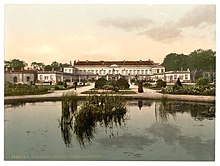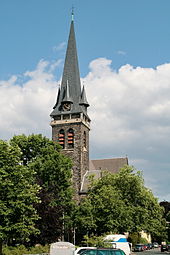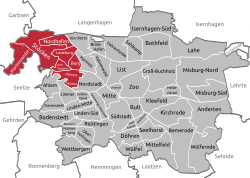Herrenhausen-Stöcken (German: [ˈhɛʁn̩ˌhaʊzn̩]; Eastphalian: Herrnhusen) is a borough of the German city of Hanover, northwest of the city centre. In 2020 it had a population of 37,543. It consists of the quarters Burg, Herrenhausen, Ledeburg, Leinhausen, Marienwerder and Stöcken.
Herrenhausen-Stöcken | |
|---|---|
 The reconstructed Herrenhausen Palace in 2013 | |
| Coordinates: 52°24′14″N 9°41′08″E / 52.40389°N 9.68556°E | |
| Country | Germany |
| State | Lower Saxony |
| City | Hanover |
| Subdivisions | 6 quarters |
| Area | |
• Total | 21.14 km2 (8.16 sq mi) |
| Population (2020-12-31)[1] | |
• Total | 37,543 |
| • Density | 1,800/km2 (4,600/sq mi) |
| Time zone | UTC+01:00 (CET) |
| • Summer (DST) | UTC+02:00 (CEST) |
| Dialling codes | 0511 |



Industries include Johnson Controls (spun off from VARTA) and Herrenhäuser Brewery founded in 1868. Places of worship include the Herrenhäuser Kirche.
Population development
editThe graph shows the population development in the district of Herrenhausen-Stöcken since 1 January 2005.
Palace and Gardens
editA major attraction is the baroque Herrenhausen Palace and Herrenhausen Gardens, established by the House of Hanover.
The palace was largely destroyed in World War II and not rebuilt until 2013.
The 19th-century "Welfenmausoleum" in the Gardens is the burial place of Ernest Augustus, King of Hanover, and after World War II the remains of King George I of Great Britain along with his parents' were removed from the crypt of Leineschloss and reinterred there.[2]
See also
edit- House of Welf (Guelph)
References
edit- ^ "Strukturdaten der Stadtteile und Stadtbezirke 2021" (PDF). Landeshauptstadt Hannover. July 2021. Archived (PDF) from the original on 2022-10-09.
- ^ Weir, Alison (1996). Britain's Royal Families: The Complete Genealogy, Revised edition. Random House. pp. 272–276. ISBN 0-7126-7448-9.


